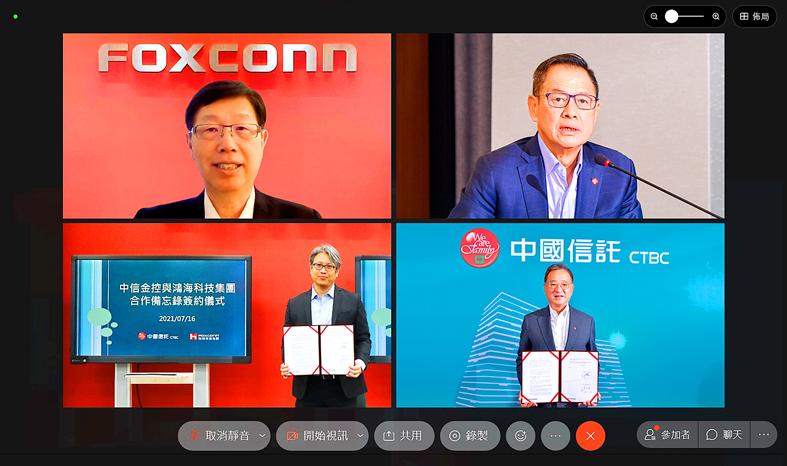Hon Hai Precision Industry Co (鴻海精密) yesterday said it is teaming up with CTBC Financial Holding Co (中信金控) to create a new fund targeting electric vehicle (EV) investments, the latest step in its quest to expand into the EV market.
Fundraising is to start in the fourth quarter, with an eye to raising between NT$5 billion and NT$10 billion (US$178.5 million and US$357.1 million) from institutional investors and Taiwan’s National Development Fund (NDF), the companies said in a joint statement.
The fund would “accelerate the rate of development” of EV companies by providing not just funding, but technical support, Hon Hai chairman Young Liu (劉揚偉) said in the statement.

Photo courtesy of Hon Hai Precision Industry Co
“With Hon Hai’s technical advantage and CTBC’s financial expertise, we hope to speed up the development of the EV industry and provide Taiwan with another world-class industry beyond semiconductors and information and communications technology,” Liu said.
Bringing public and private investment together is the key to fostering the next generation of Taiwanese EV companies, CTBC Bank chairman Morris Li (利明献) said.
“We will proactively invite the NDF, financial investors and industrial sector investors to join us, and contribute to upgrading Taiwan’s industrial capabilities,” Li said.
More than 1,800 EV supply chain companies have joined the Mobility in Harmony, or MIH, alliance, which was started by Hon Hai, but became an independent entity this month.
The fund will not be limited to companies that are in the MIH alliance, but it will be “a factor in selection,” Hon Hai said.
Hon Hai is a participant in Japan’s Softbank Vision Fund, China’s Sinovation venture and other similar ventures in the US. However, this is the first time it has focused on investing in a Taiwanese fund.
“In the past, Hon Hai mostly participated in overseas venture capital funds,” the company said. “This is the first time we are participating in a fund that primarily supports industry in Taiwan.”
“It is in line with our company’s direction of development into EVs,” it said.
“In the future, EV start-ups or traditional companies wishing to participate in the EV space will be able to come to the fund to obtain industry connections, funds and access to technology,” Hon Hai said.

UNCERTAINTY: Innolux activated a stringent supply chain management mechanism, as it did during the COVID-19 pandemic, to ensure optimal inventory levels for customers Flat-panel display makers AUO Corp (友達) and Innolux Corp (群創) yesterday said that about 12 to 20 percent of their display business is at risk of potential US tariffs and that they would relocate production or shipment destinations to mitigate the levies’ effects. US tariffs would have a direct impact of US$200 million on AUO’s revenue, company chairman Paul Peng (彭雙浪) told reporters on the sidelines of the Touch Taiwan trade show in Taipei yesterday. That would make up about 12 percent of the company’s overall revenue. To cope with the tariff uncertainty, AUO plans to allocate its production to manufacturing facilities in

TAKING STOCK: A Taiwanese cookware firm in Vietnam urged customers to assess inventory or place orders early so shipments can reach the US while tariffs are paused Taiwanese businesses in Vietnam are exploring alternatives after the White House imposed a 46 percent import duty on Vietnamese goods, following US President Donald Trump’s announcement of “reciprocal” tariffs on the US’ trading partners. Lo Shih-liang (羅世良), chairman of Brico Industry Co (裕茂工業), a Taiwanese company that manufactures cast iron cookware and stove components in Vietnam, said that more than 40 percent of his business was tied to the US market, describing the constant US policy shifts as an emotional roller coaster. “I work during the day and stay up all night watching the news. I’ve been following US news until 3am

COLLABORATION: Given Taiwan’s key position in global supply chains, the US firm is discussing strategies with local partners and clients to deal with global uncertainties Advanced Micro Devices Inc (AMD) yesterday said it is meeting with local ecosystem partners, including Taiwan Semiconductor Manufacturing Co (TSMC, 台積電), to discuss strategies, including long-term manufacturing, to navigate uncertainties such as US tariffs, as Taiwan occupies an important position in global supply chains. AMD chief executive officer Lisa Su (蘇姿丰) told reporters that Taiwan is an important part of the chip designer’s ecosystem and she is discussing with partners and customers in Taiwan to forge strong collaborations on different areas during this critical period. AMD has just become the first artificial-intelligence (AI) server chip customer of TSMC to utilize its advanced

Six years ago, LVMH’s billionaire CEO Bernard Arnault and US President Donald Trump cut the blue ribbon on a factory in rural Texas that would make designer handbags for Louis Vuitton, one of the world’s best-known luxury brands. However, since the high-profile opening, the factory has faced a host of problems limiting production, 11 former Louis Vuitton employees said. The site has consistently ranked among the worst-performing for Louis Vuitton globally, “significantly” underperforming other facilities, said three former Louis Vuitton workers and a senior industry source, who cited internal rankings shared with staff. The plant’s problems — which have not